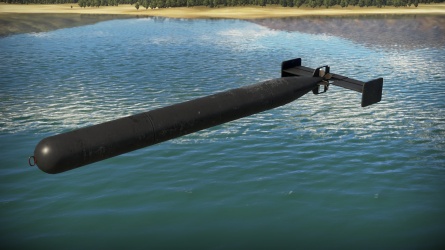18-inch Mark XV Torpedo
Contents
Description
The 18-inch Mark XV, or simply Mark XV, is a British torpedo. It is used as both an aerial torpedo on some torpedo bombers and as a ship launched torpedo on some Motor Torpedo Boats (MTBs).
Vehicles equipped with this weapon
General info
The Mark XV is a mid-war torpedo. It was deigned for both aerial use and use on torpedo boats. Being an aerial torpedo it is smaller than the 21 inch (53.3 mm) torpedoes designed exclusively for use on ships.
| Torpedo characteristics | ||||||||
|---|---|---|---|---|---|---|---|---|
| Torpedo Mode | Mass (kg) | Maximum speed in water (km/h) | Travel distance (km) | Depth stroke (m) | Arming distance (m) | Explosive type | Explosive mass (kg) | TNT equivalent (kg) |
| No | 817 | 61 | 3.20 | 1 | 50 | Torpex | 247 | 395.2 |
| Yes | 817 | 54 | 5.02 | 1 | 50 | Torpex | 247 | 395.2 |
The naval version of the torpedo has an optional "Torpedo Mode" modification which increases the range from 3.2 km to 5 km, but reduces the speed by 7 km/h, bringing it to 54 km/h.
| Torpedo mode specification changes | |
|---|---|
| Max distance (m) | Max speed (m/s) |
| +1828 | -7 |
Effective damage
The increased warhead size compared to the Mark XII, means that the it is capable of killing just about any player controlled ships with a single hit. It is sometimes possible for some cruisers to survive a hit from a Mark XV, but this is rare.
Comparison with analogues
Compared to the earlier Mark XII torpedo the Mark XV is slower but has a much more powerful warhead (more than twice the size).
Usage in battles
When dropped from aircraft the Mark XV has a much better speed range than the Mark XII, being able to be dropped at speeds up to 443 km/h (compared to 281 km/h), however the max drop altitude is only marginally improved to 122 m.
Pros and cons
Pros:
- Large warhead for a 45 cm torpedo
- Better airdrop characteristics than the Mark XII
Cons:
- Slower than the Mark XII
History
The Mark XV entered service in 1942 with the Fleet Air Arm, RAF Coastal Command and Royal Navy. It was the first 18-inch torpedo to use Torpex (short for torpedo explosive) instead of TNT. Torpex is 50% more powerful than TNT by mass.
The Mark XV was the standard airborne torpedo during the last years of the war, and an approximated 591 torpedoes were expended in September 1944. The Mark XV was heavily based on the earlier 18 inch Mark XII (450 mm) torpedo, and therefore had some resemblances with it. The Mark XV used the same burner cycle engine as the Mark XII, but with a higher air vessel pressure. This gave the Mark XV a greater range at 40 knots, compared to the Mark XII at the same speed setting. Further improvement was also made to the constructional strength of the torpedo, allowing for water entry at up to 270 knots. Land-based torpedo aircraft and motor torpedo boats had a heavy warhead load of 247 kg of Torpex, which dramatically increased the impact power of the torpedo. However, for wartime carrier-based torpedo aircraft this warhead load proved too heavy, so they were initially carrying a warhead of 176 kg TNT. Later in the war this was increased to 196 kg of Torpex.
While the torpedo carried by aircraft had one speed-setting of 40 knots, the torpedoes used by the navy had a second speed setting at 33 knots. This enabled the torpedoes to have a greater range.
To increase the probability of a successful drop from aircraft, the Mark XV improved the anti-roll gear from the Mark XII by replacing the drum-control gear (DCG) wire drum with a Monoplane Air Tail (MAT) Mark IV. The MAT Mk IV had ailerons which were gyro-controlled. The gyro equipment was actually stored within the MAT, meaning that for aircraft that had limited space for a torpedo, could use the Mark XV torpedo with the earlier MATs and the DCG.
The Mark XV torpedo was succeeded by the Mark XVII torpedo, which was further strengthened and modified to sustain a drop at 350 knots. This was possible due to the MAT Mk V, which was a MAT Mk IV with a parachute to slow down the torpedo. The Mark XVII torpedo could either have a warhead of 272 kg or 196 kg Torpex.
Media
Excellent additions to the article would be video guides, screenshots from the game, and photos.
See also
Links to the articles on the War Thunder Wiki that you think will be useful for the reader, for example:
- reference to the article about the variant of the weapon;
- references to approximate analogues by other nations and research trees.
External links
- [Wikipedia] British 18-inch torpedo
- https://www.rafmuseum.org.uk/documents/Research/RAF-Historical-Society-Journals/Journal_45_Seminar_conventional_weapons.pdf
- "Naval Weapons of World War Two" by John Campbell




